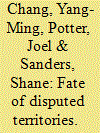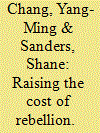| Srl | Item |
| 1 |
ID:
079649


|
|
|
|
|
| Publication |
2007.
|
| Summary/Abstract |
This paper presents a simple model to characterize the outcome of a land dispute between two rival parties using a Stackelberg game. Unlike Gershenson and Grossman (2000), we assume that the opposing parties have access to different technologies for challenging and defending in conflict. We derive the conditions under which territorial conflict between the two parties is less likely to persist indefinitely. Allowing for an exogenous destruction term as in Garfinkel and Skaperdas (2000), we show that, when the nature of conflict becomes more destructive, the likelihood of a peaceful outcome, in which the territory's initial possessor deters the challenging party, increases if the initial possessor holds more intrinsic value for the disputed land. Following Siqueira (2003), our model has policy implications for peace through third-party intervention
|
|
|
|
|
|
|
|
|
|
|
|
|
|
|
|
| 2 |
ID:
089496


|
|
|
|
|
| Publication |
2009.
|
| Summary/Abstract |
This paper presents a simple model to characterize explicitly the role that an intervening third party plays in raising the cost of rebellion in an intrastate conflict. Extending the Gershenson-Grossman (2000) framework of conflict in a two-stage game to the case involving outside intervention in a three-stage game as in Chang et al. (2007b), we examine the conditions under which an outside party optimally intervenes such that (i) the strength of the rebel group is diminished or (ii) the rebellion is deterred altogether. We also find conditions in which a third party optimally intervenes but at a level insufficient to deter rebellion. Such behavior, which improves the incumbent government's potential to succeed in conflict, is overlooked in some conflict studies evaluating the effectiveness of intervention. One policy implication of the model is that an increase in the strength of inter-governmental trade partnerships increases the likelihood that third-party intervention deters rebellion.
|
|
|
|
|
|
|
|
|
|
|
|
|
|
|
|